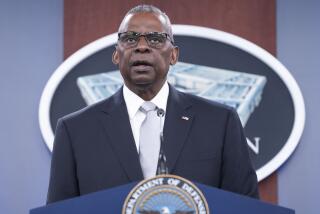U.S. aims to bolster ties with Persian Gulf states
The Obama administration is mobilizing across several fronts to shore up its relationship with Persian Gulf leaders who fear the United States is reducing its commitments in the Middle East.
In unusually blunt remarks Wednesday, the State Department’s No. 2 diplomat urged the Gulf nations to overcome their differences with Washington, warning that the two sides cannot afford to become competitors in nations in upheaval, such as Syria and Egypt. No other country can offer the rich but thinly populated Gulf states as much protection as the United States, said Deputy Secretary of State William J. Burns.
Separately, White House officials disclosed that they are bringing in a respected Middle East expert and former peace negotiator, Robert Malley, to help strengthen ties with Gulf nations. The White House has also begun preparing for a fence-mending visit to Saudi Arabia by President Obama next month.
The United States and the rich oil producers have been bound by security and economic interests for decades. But especially since the Arab Spring revolutions of 2011, the Gulf states have begun to worry that the United States is scaling back its commitments, and have increasingly charted their own course, sometimes at cross purposes with Washington.
The Gulf states have been alarmed that Washington has not done more to provide military support to the embattled anti-government opposition in Syria. In recent days, the differences have spilled into the open, as Saudi officials have said they intend to provide rebels shoulder-launched antiaircraft missiles over apparent White House opposition.
In an appearance at the Center for Strategic and International Studies in Washington, Burns said it is easy to understand why Americans, weary of war and less dependent on Gulf oil, “would wonder if they really need to pay so much attention to the Middle East.”
He said it is also understandable why some Gulf states would “question our reliability as partners,” given U.S. hopes for energy independence, and American warnings that the old Middle East power structures, such as the Gulf monarchies, will soon change. He acknowledged differences in approach to Iran and the “huge problem” of competing views on what should be done to resolve Syria’s civil war.
But he cautioned that “no country or collection of countries can do for the Gulf states what the United States has done and continues to do.”
He said that if the two sides work at cross purposes, it will “enable hard-liners and extremists of one stripe or another to erode” the so-called Arab Center of moderate elements.
Burns insisted that the U.S. military commitment to the Gulf is greater than ever, including 35,000 troops at more than a dozen bases in the region. He noted that the administration is selling highly sophisticated arms to the region, including F-16 fighters and the missile defense systems designed to shield the states.
He sought to assure the Gulf leaders that the United States will not accept a flawed deal in the pending international negotiations over Iran’s nuclear program, and that Washington remains concerned about Tehran’s efforts to undermine its Arab rivals.
He said the administration and the Gulf states should continue their efforts to prop up fragile Jordan and Lebanon, which have become more unstable because of the influx of Syrian refugees.
Burns pointed out that Secretary of State John F. Kerry continues his efforts to reach an Israeli-Palestinian peace deal, a cause the Gulf leaders support despite mounting criticism.
He said the Gulf states and the U.S. should work together in turbulent Egypt, but urged the Arabs to accept that wealth and power must be more widely shared in the largest Arab state.
“No transition can succeed without a sense of respect for political pluralism and a sense of confidence in a better and more inclusive economic future,” he said.
He warned that the billions of dollars that the Gulf has funneled into Egypt will produce “little sustainable effect” without more careful plans for how the money is spent.
Twitter: @richtpau
More to Read
Start your day right
Sign up for Essential California for news, features and recommendations from the L.A. Times and beyond in your inbox six days a week.
You may occasionally receive promotional content from the Los Angeles Times.







